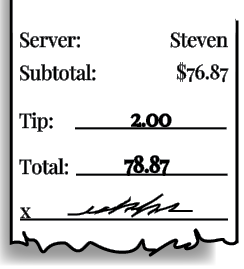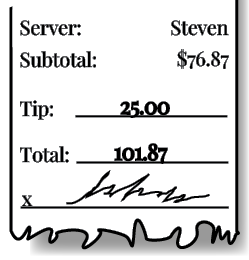

In today’s society, tipping culture has spiraled out of control. According to the New York Post, 76.1% of consumers and service workers agree that tipping culture has gone too far, in a phenomenon the PEW research center describes as “Tipflation.” Tipflation has become a nuisance for consumers and employees in today’s society.
From my point of view, tipping was not always as intense as it is nowadays. It feels like before COVID-19, the general norm in my experience was 20% for a good job and lower for a sub-par job. Now, with the norm being 18%, 20% or 25%, I feel less inclined to tip 20%, seeing as I am pressured at minimum to pay 18%. Along with the increase in minimum tipping, the social pressure of tipping also makes it an inconvenience. I feel guilty if I do not tip well, even if it is for places that should not need tipping such as coffee shops or Panera. When it comes to a group setting, tipping can become even more stressful, especially when others expect you to tip for something that does not call for it.
In general, tipflation has gotten out of hand because of the spread of tipping into previously “non-tipping” industries, such as grocery stores and home repair services. According to PBS Newshour, the rise of digital payment systems has introduced tipping prompts in businesses where tipping was not traditionally expected, leading to growing frustration among customers. Unlike traditional tip jars, which consumers can ignore, these automatic tipping screens put more pressure on consumers to tip even when they are provided limited service.
In addition, companies and employers have grown increasingly greedy, pressuring consumers to pay the wages of their workers through tipping, rather than providing fair payment. In fact, the minimum wage laws outline only $2.13 an hour for the minimum wage for tipped employees, compared to $7.25 for non-tipped employees. By expecting tips to make up for the $5.12 not paid by employers, companies cut their costs profoundly while taking advantage of the consumer.
In contrast to the United States, tipping is considered optional in Europe, with the standard ranging from 5% to 10% on the high end according to N26, a digital bank based in the EU. This practice is possible because of the higher minimum wage in the EU versus the US, where service industry workers rely on tips over a steady income. For example, in France and Germany, the minimum wage laws do not discriminate on the basis of tipped versus non-tipped employees and are both around 50% of the average annual salary in their respective countries. In the US, however, the minimum wage hovers around 20% of the average annual salary. With this disparity in minimum wages, it is clear that the US is far behind its European counterparts when it comes to providing adequate wages to its workers. That gap should not be compensated by tipping.
Overall, tipping has gone too far, and is further exacerbated by the expanding amount of tipped industries and corporate greed. In the end, not much will change for consumers or workers until the minimum wage is raised, offsetting the current reliance on tips, which will ensure workers a stable, reliable income to support their families.

Tipping has faced significant criticism lately, with many arguing it would be unnecessary if workers were simply paid better wages. However, tipping offers many benefits for both the tipped worker and the tipper.
Tipping plays a vital role in supporting workers’ income and enhancing the dining experience. According to the National Restaurant Association, about 90% of tipped workers prefer tipping over pre-determined wages, with 87% expressing concern that their earnings would decrease if their employers paid them the full minimum wage instead of allowing tips. Even if these workers were paid the federal minimum wage of $7.25, they would still face a low income with no additional supplements. Without tips, many would face greater financial uncertainty, and the personal incentive to provide good service could diminish, impacting the overall experience.
Tips also encourage more interaction and better service between the customer and the server. According to Pew Research, 77% of adults will generally tip higher amounts to their server if they interact more and if they like their server more. The more a customer feels connected, the more likely they are to return to the same place, driving up sales. Similarly, the incentive of receiving tips can encourage employees to provide better service, making efforts to greet customers, recommend dishes or products or make small talk. Overall, these exchanges, which are strengthened by tipping, improve the experience for both parties alike.
Tipping can also help small business owners grow and thrive. According to Gusto, a platform that provides payroll and HR solutions, tips enable small businesses to attract talent by offering higher overall compensation than they might otherwise afford. This benefits not only employees, who receive increased wages, but also small businesses, which often operate on tight margins and must compete with larger, more established companies. Additionally, with 82% of Americans expressing a desire to support local small businesses, according to BusinessDasher, tipping becomes a practical way to contribute to their success.
In addition, dining charges are generally lower in places where tipping exists. While dining around the world often includes fees for both meal and service, in the United States, service charges are lower because tipping supplements workers income. In contrast, countries that forgo tipping in favor of mandatory service charge typically have higher meal prices due to this additional fee. Pew Research shows that around 72% of Americans oppose mandatory service charges, indicating a stronger preference for tipping than the alternative in fixed charges.
Ultimately, tipping remains an essential part of the dining experience, not just as a rewarding service but as a system that empowers both workers and customers. It provides workers with an opportunity to earn beyond stagnant wages and creates a dynamic where service is directly recognized. While critics argue for replacing tipping with higher wages, such a shift could strip away the flexibility and personalization that make dining out unique.
-
 Debates[DEBATES] Should we de-extinct species?
Debates[DEBATES] Should we de-extinct species? -
Debates[DEBATES] The GMO dilemma
-
 Debates[DEBATES] Reevaluating Primary Care Pay
Debates[DEBATES] Reevaluating Primary Care Pay -
![[DEBATES] Prestigious colleges: value or hype?](https://www.mvviewer.org/wp-content/uploads/2024/12/buildings-1200x654.png) Debates[DEBATES] Prestigious colleges: value or hype?
Debates[DEBATES] Prestigious colleges: value or hype? -
 Debates[DEBATES] The vote split: People vs. process
Debates[DEBATES] The vote split: People vs. process -
 Debates[DEBATES] "Don't wake the demon up"
Debates[DEBATES] "Don't wake the demon up" -
 Debates[DEBATES] "It's just Big Me"
Debates[DEBATES] "It's just Big Me" -
![[DEBATE] Should advanced classes be eliminated?](https://www.mvviewer.org/wp-content/uploads/2024/01/Untitled161-2-1200x796.png) Debates[DEBATE] Should advanced classes be eliminated?
Debates[DEBATE] Should advanced classes be eliminated? -
![[DEBATE] What’s better? Coed vs single-gender schools](https://www.mvviewer.org/wp-content/uploads/2023/12/Untitled153_20231215153759-1-1200x405.png) Debates[DEBATE] What’s better? Coed vs single-gender schools
Debates[DEBATE] What’s better? Coed vs single-gender schools -
![[DEBATE] Should legacy admissions still exist?](https://www.mvviewer.org/wp-content/uploads/2023/12/IMG_1460-1200x1200.jpg) Debates[DEBATE] Should legacy admissions still exist?
Debates[DEBATE] Should legacy admissions still exist?





